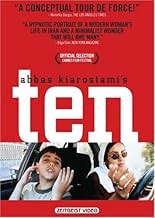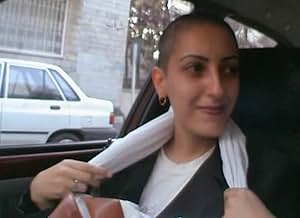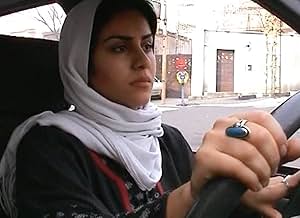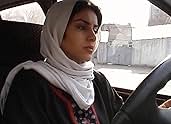IMDb रेटिंग
7.4/10
8.9 हज़ार
आपकी रेटिंग
अपनी भाषा में प्लॉट जोड़ेंA visual social examination in the form of ten conversations between a driving woman and her various pick-ups and hitchhikers.A visual social examination in the form of ten conversations between a driving woman and her various pick-ups and hitchhikers.A visual social examination in the form of ten conversations between a driving woman and her various pick-ups and hitchhikers.
- पुरस्कार
- 1 जीत और कुल 4 नामांकन
Amina Maher
- Amin
- (as Amin Maher)
Roya Akbari
- Prostitute + Lover
- (as Roya Arabshahi)
फ़ीचर्ड समीक्षाएं
Ten is an intriguing movie. Kiarostami explores the abilities of digital camera by mounting it at just two fixed angles on the dashboard of a car, showing us almost only the driver's and the passenger's faces. Such a stationary structure surprises by its moving content, which takes shape as the movie unfolds.
The driver is a young Iranian divorcée, recently remarried, whose conversations with a son, sisters, a young and an old woman makes up the ten episodes of the movie.
The performance taken from the kid is astonishingly natural, and other characters also appear to be just playing their everyday lives. Kiarostami opens an eye through the little gap of its two fixed digital cameras on the mundane facts of the Iran's capital life as experienced by a typical middle-class woman. The plots are so natural no one can find a better way of experiencing the knotted, contradictory complexity of such a woman's life in Iran from outside. The flow is of the scenes is smooth and the dialogues are, at least to the Iranian audience, courageous and funny, though familiar at the same time. It's a movie worth watching more than once.
The driver is a young Iranian divorcée, recently remarried, whose conversations with a son, sisters, a young and an old woman makes up the ten episodes of the movie.
The performance taken from the kid is astonishingly natural, and other characters also appear to be just playing their everyday lives. Kiarostami opens an eye through the little gap of its two fixed digital cameras on the mundane facts of the Iran's capital life as experienced by a typical middle-class woman. The plots are so natural no one can find a better way of experiencing the knotted, contradictory complexity of such a woman's life in Iran from outside. The flow is of the scenes is smooth and the dialogues are, at least to the Iranian audience, courageous and funny, though familiar at the same time. It's a movie worth watching more than once.
"Ten" makes the third Iranian film I have seen. I was very impressed with the last two I saw and so I decided to see this one and I was not disappointed.
Abbas Kiarostami gives "reality tv" (movie ?) a whole new meaning by having a mini camera installed on the dashboard of a car to video tape what appears to be a woman's daily driving routine.
There are ten segments that are video taped (hence the title of the movie) as she drives to and from her daily activities.
First off, we get to see her and her son, Amin, discussing her divorce from Amin's father and how displeased Amin is with the fact that they divorced. Amin, of course, is bitter, as most children are who have had to live thru a divorce. He desperately wants to go live with his father.
Two more times throughout the movie we see Amin and his mother furthering their discussion and we get to see how their relationship continues to deteriorate.
Amin's mother and her sister are seen in one segment discussing Amin and his behavior and the aunt even gives her opinion that it might be better for the boy to go live with the father on a full time basis for a while.
We also see Amin's mother give an old lady a lift to a mauseliam so the old lady can go do her religious rituals.
Amin's mother also gives a lift to a hooker and talks with her for a while in hopes to get her to chose a different life.
All in all, the movie shows a deeply sensitive woman who wants to help others and be there for her son while being her own person.
It's truly a heart felt movie to see how caring she is even though her relationship with her son appears doomed.
Abbas Kiarostami gives "reality tv" (movie ?) a whole new meaning by having a mini camera installed on the dashboard of a car to video tape what appears to be a woman's daily driving routine.
There are ten segments that are video taped (hence the title of the movie) as she drives to and from her daily activities.
First off, we get to see her and her son, Amin, discussing her divorce from Amin's father and how displeased Amin is with the fact that they divorced. Amin, of course, is bitter, as most children are who have had to live thru a divorce. He desperately wants to go live with his father.
Two more times throughout the movie we see Amin and his mother furthering their discussion and we get to see how their relationship continues to deteriorate.
Amin's mother and her sister are seen in one segment discussing Amin and his behavior and the aunt even gives her opinion that it might be better for the boy to go live with the father on a full time basis for a while.
We also see Amin's mother give an old lady a lift to a mauseliam so the old lady can go do her religious rituals.
Amin's mother also gives a lift to a hooker and talks with her for a while in hopes to get her to chose a different life.
All in all, the movie shows a deeply sensitive woman who wants to help others and be there for her son while being her own person.
It's truly a heart felt movie to see how caring she is even though her relationship with her son appears doomed.
I have seen many impressive Iranian films over the years. "Ten" may be the very best of them for a variety of reasons. I think the film is remarkable because it looks so simple, but I imagine setting up the camera and capturing the realistic dialogue and plot-line we see in the film had to have taken a lot of preparation. I also think the director deliberately chose scenery to accommodate the backdrop of the film, and he must have driven around Teheran constantly to figure out which images to put in the background. I think the scenes with the murals of new arch-conservative president are very telling. "Ten" seems to have a lot of messages under the radar, including the subversive powers of all governments (certainly including our own in America) to censor art. I think the relationship between the mother and her son is a very poignant one, and it shows how children and adults simply live in different spheres of the universe. Film is strikingly similar in some aspects to American independent filmmaker Rob Nilsson's film "Signal 7" which came out over 20 years ago.
I saw this in memory of Abbas Kiarostami who passed away the other day, this Sufi seer of transient, evanescent life that circles back and goes out again like fireflies in the night. I have felt him so close in spirit; it was one of the saddest losses in recent years.
My relationship with him is rather simple and uncluttered, much like the films he makes. Shucks about form and whether the camera moves or not as far as I'm concerned. It's a tool to create stillness so that simple gestures will ring wide; but you can't still the mind of a viewer who has a million thoughts running in his head while watching, and you can't prevent a viewer who wants to remain still by moving the camera.
And I urge you as always to not settle for receiving films, his or anyone else's, as only cultural items that were made for us to intellectualize and keep up to date with norms of life in faraway places. It can make for interesting post-viewing discussion, but most of all, make sure to know things privately in your own self, allow them to have their cosmic import that speaks about the fact that here you are, living a life that will last a little while more.
A woman drives around Tehran, having conversations with people on the passenger's seat during a day and a night, this is the whole story here. We never leave the car. The camera simply flits between shots of the driver and passenger.
By way of insights, you will glean several here, about the place of women in Iran, expectations of being a housewife and how hard it is to obtain a divorce. Religion as focal point. You might consider that her unruly son who constantly berates her is promulgating larger social attitudes at play; a far more eyeopening way than showing us an angry mullah. You will get to decide how much of all this echoes your own society.
But now, how about we allow it to simply be about a woman who drives around life that wells up around her with anxieties?
A life that breaks down around the edges, as all lives do. A marriage that didn't work out and a son that pushes himself away from her. A man and woman who wanted different things from life and parted ways. You might appreciate here that the man allowed himself to be painted as drug user before the court as the only way for her to get the divorce.
Parallel, possible lives materialize in the seat next to her. A sister who is going through a breakup she has already gone through; how hopeless it is to cling to love that isn't there. Another woman whose marriage was broken off at the last moment. A prostitute who scoffs at the conventions of marriage. An old woman on her way to the mosque.
It ends with a son who is growing up to be a man and she has to softly let go into life. It isn't just a social film, but you'll have to allow yourself to watch from a softer distance. Kiarostami does it here, bestows the gift of wisdom. In the right ears, it will be a sutra teaching us impermanence and non-attachment.
My relationship with him is rather simple and uncluttered, much like the films he makes. Shucks about form and whether the camera moves or not as far as I'm concerned. It's a tool to create stillness so that simple gestures will ring wide; but you can't still the mind of a viewer who has a million thoughts running in his head while watching, and you can't prevent a viewer who wants to remain still by moving the camera.
And I urge you as always to not settle for receiving films, his or anyone else's, as only cultural items that were made for us to intellectualize and keep up to date with norms of life in faraway places. It can make for interesting post-viewing discussion, but most of all, make sure to know things privately in your own self, allow them to have their cosmic import that speaks about the fact that here you are, living a life that will last a little while more.
A woman drives around Tehran, having conversations with people on the passenger's seat during a day and a night, this is the whole story here. We never leave the car. The camera simply flits between shots of the driver and passenger.
By way of insights, you will glean several here, about the place of women in Iran, expectations of being a housewife and how hard it is to obtain a divorce. Religion as focal point. You might consider that her unruly son who constantly berates her is promulgating larger social attitudes at play; a far more eyeopening way than showing us an angry mullah. You will get to decide how much of all this echoes your own society.
But now, how about we allow it to simply be about a woman who drives around life that wells up around her with anxieties?
A life that breaks down around the edges, as all lives do. A marriage that didn't work out and a son that pushes himself away from her. A man and woman who wanted different things from life and parted ways. You might appreciate here that the man allowed himself to be painted as drug user before the court as the only way for her to get the divorce.
Parallel, possible lives materialize in the seat next to her. A sister who is going through a breakup she has already gone through; how hopeless it is to cling to love that isn't there. Another woman whose marriage was broken off at the last moment. A prostitute who scoffs at the conventions of marriage. An old woman on her way to the mosque.
It ends with a son who is growing up to be a man and she has to softly let go into life. It isn't just a social film, but you'll have to allow yourself to watch from a softer distance. Kiarostami does it here, bestows the gift of wisdom. In the right ears, it will be a sutra teaching us impermanence and non-attachment.
Yes, it's a gimmick: the entire film is shot from the dashboard of a car, and only the driver and the passenger are heard and (sometimes) seen. This gimmick will not please everyone, and hardly qualifies the film as a masterpiece. But Hitchcock's brilliant "Rear Window" was a gimmick too, and Kiarostami's "10" is no less worthy of attention. A movie has to be done well, regardless of its tricks, and "10" fits the bill. The driver of the car also drives the conflict; she is a recently divorced Iranian woman in a country in which women barely have the right to divorce at all. As the city rushes past--it's great fun to watch the people and places outside--she curses the drivers and pedestrians along the way but holds her own against the crises in the passenger's seat. Funny thing about a car: it gives one the sense of control (here, that's clearly an illusion) and the oxymoronic ability to remain private even while out in public. She and her women passengers air their grievances within this zone of safety; a scene in which a passenger slowly removes her head covering, a symbol of repression, is moving and unsettling. The greatest conflict, however, is between the driver and her young son, who's bitter about the divorce and lets his mother unravel until he, not she, controls where the car is heading. The boy's performance is astonishingly real, as much for the way he fills the silences as for his sharp and sometimes humorous counterpoints. The film could have done without the "countdown" of the 10 conversations--the source of the title--but no matter: everything in between is a delight.
8 out of 10
8 out of 10
क्या आपको पता है
- ट्रिवियाApart from Mania Akbari, actors are non-professional. The young boy is played by her own son and their relationship is partly based on real-life elements.
- गूफ़Car windows, both driver's and passenger's, vary between being closed, part-open or open between shots.
- भाव
Prostitute: [to a Married woman] You are wholesailers. We are retailers.
- साउंडट्रैकWalking In The Air
Written and Performed by Howard Blake
© Chester Music Limited represented by Première Music Group
टॉप पसंद
रेटिंग देने के लिए साइन-इन करें और वैयक्तिकृत सुझावों के लिए वॉचलिस्ट करें
- How long is Ten?Alexa द्वारा संचालित
विवरण
- रिलीज़ की तारीख़
- कंट्री ऑफ़ ओरिजिन
- आधिकारिक साइट
- भाषा
- इस रूप में भी जाना जाता है
- Ten
- फ़िल्माने की जगहें
- उत्पादन कंपनियां
- IMDbPro पर और कंपनी क्रेडिट देखें
बॉक्स ऑफ़िस
- US और कनाडा में सकल
- $1,05,990
- US और कनाडा में पहले सप्ताह में कुल कमाई
- $10,559
- 9 मार्च 2003
- दुनिया भर में सकल
- $4,52,895
इस पेज में योगदान दें
किसी बदलाव का सुझाव दें या अनुपलब्ध कॉन्टेंट जोड़ें






















